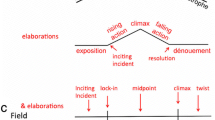Abstract
Decoupling a modestly construed Narrative Self Shaping Hypothesis (or NSSH) from Strong Narrativism this paper attempts to motivate devoting our intellectual energies to the former. Section one briefly introduces the notions of self-shaping and rehearses reasons for thinking that self-shaping, in a suitably tame form, is, at least to some extent, simply unavoidable for reflective beings. It is against this background that the basic commitments of a modest Narrative Self-Shaping Hypothesis (or NSSH) are articulated. Section two identifies a foundational commitment—the central tenet—of all Strong Narrativist proposals, those that posit a necessary link between narrative self-shaping and narrative self-experience. As will be shown, in the hands of Strong Narrativists the latter notion is unpacked in stronger or weaker ways by appeal to the notion of implicit Narrativizing. Section three reminds the reader of Strawson’s (2004a) challenge to Strong Narrativism. It is revealed that Strawson’s objections are most effective if they target Strong Narrativism’s central tenet construed as a phenomenological revelation about what is necessary for self-experience and not merely the psychological Narrativity thesis, construed as an empirical hypothesis about typical Narrativizing proclivities. Having set the stage, section four critically examines two different strategies, pursued by Rudd (2012) and Schechtman (2007) respectively, for escaping the horns Strawson’s dilemma poses for Strong Narrativism. In the end both strategies invoke the notion of implicit Narrativizing at a crucial juncture. Section five reveals that a substantive proposal about what implicit Narrativizing might be is lacking, hence we have no reason to believe that it actually occurs. It is concluded that, as things stand, Strong Narrativism has no way of avoiding the horns of Strawson’s dilemma. Brief concluding remarks in the final section are a reminder why, despite their modesty, softer versions of the NSSH—when coupled with a developmental proposal about the narrative basis of our folk psychological competence—are non-trivial and worthy of further development and investigation.
Similar content being viewed by others
Notes
I follow Rudd in adopting the terminology of ‘self-shaping’ because I agree with him that it “has more positive connotations than ‘self-control’ while not necessarily implying anything quite as radical as ‘self-creation’” (Rudd 2012, p. 16).
Rudd provides other examples of how coming to understand one’s own state of mind is not merely a matter of reportage. He suggests that even in cases in which we note certain longstanding attributes of ourselves we are not entitled, in many cases, to treat them as fixed and unchangeable. Thus “while I might reasonably take account of my dispositions in planning what to do (I know I’m nervous, or shy, so I know I will need to work up slowly to this task, rather than just leaping in), it is Bad Faith to simply take them as givens” (Rudd 2012, p. 15; see also Goldie 2012, p. 76).
Goldie (2012) adopts the general strategy I recommend. On the one hand, he rejects narrativism—characterized by a set of hyperbolic views about the place of narratives in our lives. On Goldie’s list of such views are: “Our lives are, in some sense, lived narratives of which we are the authors. Our lives are somehow only comprehensible through a narrative explanatory structure … Our having the right kind of narrative about our lives is, in some sense, integral to or constitutive of our being the persons we are. Our very survival depends on our having such a narrative” (p. 1). On the other hand, Goldie also resists out and out scepticism about narratives of the sort which can lead to the idea that “narratives, whatever they might be, do not play any significant part in our understanding of our lives” (p. 1).
In other places Rudd trades in talk of ‘intimate interrelations’ for something stronger, saying, “narrative, evaluation, (the limits of) self creation, and teleology—are all necessarily connected” (Rudd 2012, p. 3).
For Schechtman “there is no requirement that an identity-conferring narrative have a unifying theme, or represent a quest or have a well-defined plot” (2007, p. 163).
This is not to say that being Diachronic implies being Narrative. As Strawson (2007) makes abundantly clear “Diachronics needn’t be Narratives, even if (as may be doubted) Narratives are bound to be Diachronics, for the basic Diachronic experience of self and life exists just as defined in the absence of any specifically Narrative—story discerning, unity-seeking—attitude to one’s own life” (p. 86).
Strawson is upfront in saying: “Everyone, I think, agrees there is such a thing as Narrativity, although there is a large debate about what it is, exactly” (2007, p. 86).
For the most part, it is clear that defenders of Strong Narrativism advance it as a structural revelation about the nature of our phenomenology, but occasionally they also present it in ways that can look as if it is more straightforwardly empirical in character: “Our point is the descriptive one, that in normal adult humans, this first-personal character of experience takes a specifically narrative form” (Rudd 2012, p. 195)
Strawson accepts the weaker claim that it is always possible to narrate token episodes in our lives. This is made clear when he says: “every human life is a developmental unity … just in being the life of a single human being. If this sort of developmental unity is sufficient for narrative structure in the sense of the narrativity thesis then the thesis is trivially true of all human beings. Actually, dogs and horses can be the subject of excellent biographies” (Strawson 2004a, p. 440).
As Schechtman (2007) puts it, “There really are two different questions of identity at issue in this view, and each is answered with a slightly different narrative theory” (p. 169).
Indeed, as Schechtman sees it, once a dual-strand NSCV is on the table many of Strawson’s objections can be seen to depend on conflating the NSCV “account of persons and the account of selves” (2007, p. 171).
References
Carruthers, P. (2009). How we know our own minds: the relationship between mindreading and metacognition. Behavioral and Brain Sciences, 32, 121–138.
Fischer, E. (2011). Philosophical delusion and its therapy: Outline of a philosophical revolution. London: Routledge.
Goldie, P. (2012). The mess inside: Narrative, emotion and the mind. Oxford: Oxford University Press.
Herman, D. (2013). Storytelling and the sciences of the mind. Cambridge: MIT Press.
Hutto, D. D. (1997). The story of the self: The narrative basis of self-development. In K. Simms (Ed.), Critical studies: Ethics and the subject. Amsterdam: Rodopi.
Hutto, D. D. (2007). The narrative practice hypothesis: origins and applications of folk psychology. Narrative and Understanding Persons: Royal Institute of Philosophy Supplement, 82(60), 43–68.
Hutto, D. D. (2008a). Folk psychological narratives: The sociocultural basis of understanding reasons. Cambridge: MIT Press.
Hutto, D. D. (2008b). The narrative practice hypothesis: clarifications and consequences. Philosophical Explorations, 11(3), 175–192.
Hutto, D. D. (2009a). ToM rules, but it is not OK. In A. Costall & I. Leudar (Eds.), Against theory of mind (pp. 221–238). Basingstoke: Palgrave.
Hutto, D. D. (2009b). Folk psychology as narrative practice. Journal of Consciousness Studies, 16(6–8), 9–39.
Hutto D. D. (forthcoming). Narrative understanding. In N. Carroll & J. Gibson (Eds.), The Routledge companion to philosophy of literature. London: Routledge.
Korsgaard, C. (1996). The sources of normativity. Cambridge: Cambridge University Press.
MacIntyre, A. (1984). After virtue. London: Duckworth.
Mulhall, S. (2013). The Self and its shadows: a book of essays on individuality as negation in philosophy and the arts. Oxford: Oxford University Press.
Nelson, K. (2009). Narrative practices and folk psychology: a perspective from developmental psychology. Journal of Consciousness Studies, 16(6–8), 69–93.
Rudd, A. (2009). In defence of narrative. European Journal of Philosophy, 17(1), 60–75.
Rudd, A. (2012). Self, value, and narrative. Oxford: Oxford University Press.
Schechtman, M. (1996). The constitution of selves. Ithaca: Cornell University Press.
Schechtman, M. (2005). Self-expression and self-control. In G. Strawson (Ed.), The self? (pp. 45–62). Oxford: Blackwell.
Schechtman, M. (2007). Stories, lives, and basic survival: A refinement and defense of the narrative view. In D. D. Hutto (Ed.), Narrative and understanding persons (pp. 155–178). Cambridge: Cambridge University Press.
Schechtman, M. (2011). The narrative self. In S. Gallagher (Ed.), The Oxford handbook of the self (pp. 394–416). Oxford: Oxford University Press.
Sterelny, K. (2013). The evolved apprentice: How evolution made humans unique. Cambridge: MIT Press.
Strawson, G. (2004a). Against narrativity. Ratio, 17(4), 428–542. Reprinted as Strawson, G. (2005). Against Narrativity. The Self? G. Strawson. (ed) Oxford, Blackwell. 63–86.
Strawson, G. (2004b). Review of making stories: law, literature, life by Jerome Bruner. The Guardian. 10 January 15.
Strawson, G. (2007). Episodic ethics. In D. D. Hutto (Ed.), Narrative and understanding persons (pp. 85–115). Cambridge: Cambridge University Press.
Taylor, C. (1985). Self-interpreting animals. Human agency and language. Cambridge: Cambridge University Press.
Tomasello, M. (2003). Constructing a language: A usage-based theory of language acquistion. Cambridge: Harvard University Press.
Velleman, J. D. (2000). The possibility of practical reason. Oxford: Oxford University Press.
Velleman, J. D. (2006). Self to self: Selected essays. Cambridge: Cambridge University Press.
Author information
Authors and Affiliations
Corresponding author
Rights and permissions
About this article
Cite this article
Hutto, D.D. Narrative self-shaping: a modest proposal. Phenom Cogn Sci 15, 21–41 (2016). https://doi.org/10.1007/s11097-014-9352-4
Published:
Issue Date:
DOI: https://doi.org/10.1007/s11097-014-9352-4




